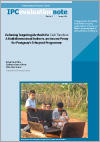
Debating Targeting Methods for Cash Transfers: A Multidimensional Index vs. an Income Proxy for Paraguay’s Tekoporã Programme
Resumo:There is a lively global debate on how to target beneficiaries of Conditional Cash Transfer (CCT) programmes. In this Evaluation Note we analyze alternative targeting methods for Paraguay’s CCT programme, Tekoporã. The major practical choice for Paraguay is between a multidimensional quality-of-life index and a proxy-means test for income. We focus on the efficiency and efficacy of these approaches by examining primarily the trade-off between leakage and coverage. Tekoporã is a CCT programme that is being scaled up in Paraguay. Like other recent CCT programmes, it was designed in the context of a national strategy for combating poverty, as part of the general effort to achieve the Millennium Development Goals (MDGs). Its pilot started in August 2005, covering 4,500 households in five districts of two departments. Tekoporã is gradually expanding and intends to cover 35 districts by 2008. These districts were selected from the pool of 66 districts that had been judged to have the most vulnerable populations, according to a scoring system based on a Geographical Prioritization Index (IPG). Tekoporã’s objective is to break the intergenerational transmission of poverty by means of the cash transfer and follow-up activities for beneficiary households. This follow-up consists of the monitoring of co-responsibilities (between beneficiaries and the programme) with regard to the supply and use of health and education facilities and the development of related family-support activities. (...)
Você também pode baixar em outras línguas:
